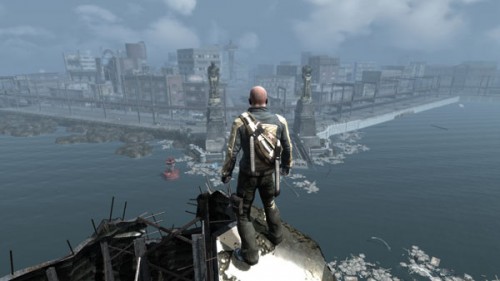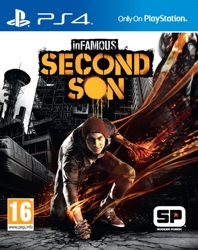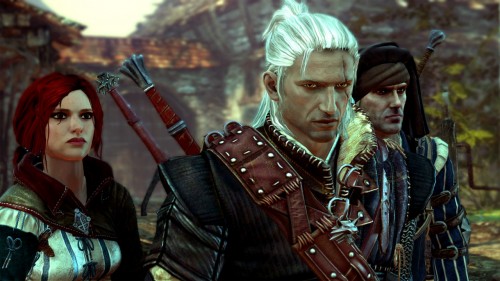The above post title pretty much sums up how I feel when playing through inFamous.
I loved the feeling of freedom that Crackdown cultivated. I loved its comic book style. I loved how the story didn’t matter and was simply an excuse to move forwards. I loved how you could do it in any order you liked. I loved how it didn’t take itself too seriously and so ended up being quite charming.

None of the above statements apply to inFamous – or at least not to the same extent – and when you’re as blatantly in love with Realtime Worlds’ adventure as I am, it’s immediately on the back foot. But despite this, I still really enjoy it. Is it something the game does right or is it just that the free-roaming city-’em-up is a genre that can’t fail to be brilliant and addictive in my eyes?
It’s probably a bit of both. inFamous also goes for a comic style, but it’s far more gritty and tries to do it more literally with story scenes presented as animated comic book panels. The story is complete nonsense, and I challenge anyone to recall the details. It takes itself kind of seriously here, trying to tell a forgettable conspiracy story with another gruff-voiced protagonist, and it does sometimes get in the way when you take time out from collecting agility orbs blast shards to spend some time wondering around in a daze because you got hit by mind-controlling tar – yes, really – again. The developers of Crackdown realised that running around with super powers, exploring the rooftops and mowing down largely helpless, dumb enemies was where the fun was coming from, whereas Sucker Punch has made enemies who are actually capable of fighting back against a powered-up Cole.
Fair enough, this isn’t an attempt to remake Crackdown, but that game’s a clear inspiration. Crackdown’s sense of humour was exemplified by its achievements, which went a long way to convincing a lot of the system’s doubters that well-designed rewards that often came out of cool stuff that you wanted to do anyway – climbing the Agency Tower and jumping off is the most obvious example – could become an important part in of the game in themselves. inFamous’s trophies, similarly, are indicative of the way you go through the game: beat this boss, clear this area, unlock some powers…
Even the trumpeted morality system is incredibly binary, not really forcing difficult decisions on the player or bringing about any real consequences. It’s mostly quite heavy-handed, and the only ones that actually offer a morality option are the designated ones: on the second island a side quest tasks you with saving a guy’s brother who has been dressed up as an enemy, and the only way to complete it is to save him. Where’s the evil option to execute him for collaborating? That’s just one example.
I’m sounding incredibly down on the game, I know, and I’ve got my work cut out to make this sound positive because I really do like the game a lot. The fact is that when you’re not bogged down in story the fun of charging around a city without limitation is still there, and when a mission doesn’t take you underground, away from the best part, and instead has you climbing some of the tallest buildings in the game, which are usually far more complex than Crackdown’s fairly basic geometry – although generally less impressive in scale and with a far more limited draw distance (check out this video to remind yourself just how far you could see in Realtime Worlds’ game), as each of the islands is more firmly segregated – it’s got the same feeling of barely constrained freedom.
Sucker Punch has also leveraged its experience from the Sly Cooper series to make the precision jumps very intuitive, as the game will make slight corrections to your trajectory if you’re heading, say, a little to the left of that climbable drain pipe or are going to overshoot the power line. Cole isn’t as agile as a powered-up agent from Crackdown, but this is done just right to keep the platforming effortless and allow you to feel unencumbered even despite the arguably smaller scale and certainly smaller jumps.
I know I should let it speak for itself and I know that it’s not Crackdown, but it’s such a clear inspiration here. Rest assured that inFamous is an excellent game in its own right and is thoroughly recommended. Just think of it as a way to keep you going until Crackdown 2, which must surely be announced at E3. This has to mean something, right?
 That this is the only first-party game to make my list may be an admission that I don’t have a Wii U more than any lack of trying from the platform holders, but the fact is Microsoft and Sony haven’t been particularly prolific in 2014.
That this is the only first-party game to make my list may be an admission that I don’t have a Wii U more than any lack of trying from the platform holders, but the fact is Microsoft and Sony haven’t been particularly prolific in 2014.

